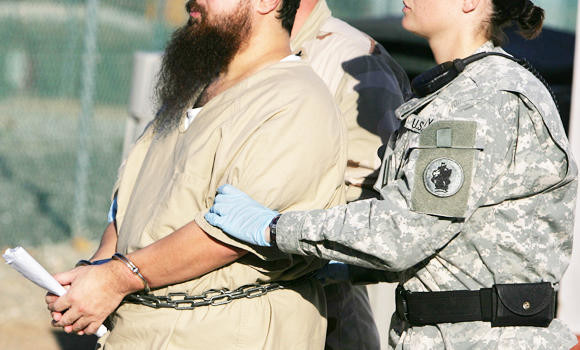NEW YORK: Arab and Muslim former detainees who say they faced harsh jail conditions due to their faith and ethnicity following the Sept. 11, 2001 attacks can pursue a lawsuit against former top US law enforcement officials, a sharply divided federal appeals court ruled on Friday.
The 2nd US Circuit Court of Appeals in New York voted 6-6 not to hear the case again before the entire court, leaving in place an earlier decision from a three-judge panel. A majority of the court’s active judges must approve such a rehearing, known as an “en banc” review.
The plaintiffs were arrested on minor immigration violations and eventually cleared of any connection to terrorism, according to the lawsuit, which was first filed in 2002. Friday’s decision clears the way for a possible trial in federal court.
The former detainees have sued officials from the administration of President George W. Bush, including former Attorney General John Ashcroft, former Federal Bureau of Investigation Director Robert Mueller and former Immigration and Naturalization Service Commissioner James Ziglar.
They claim they were singled out for solitary confinement for 23 hours per day and sleep deprivation because of their religion or ethnicity.
The decision comes days after Republican presidential candidate Donald Trump called for a temporary ban on foreign Muslims entering the country, setting off a furor both in the United States and abroad. His statement came after last week’s shooting in California by a couple authorities said were “radicalized” by extremist Islamist groups.
The 2nd Circuit rarely grants en banc reviews and has heard only one such case in the last two years.
But the split decision prompted an impassioned dissent from the six judges who voted to rehear the case, arguing that the court had failed to take into proper consideration the “unprecedented challenges” US officials faced following the Sept. 11 attacks that killed nearly 3,000 in New York, the District of Columbia and Pennsylvania.
Two judges who voted not to rehear the case disagreed, saying the restrictive conditions were alleged to have “resulted from the fear and frenzy in greater New York following the 9/11 attacks in which suspicion was founded merely upon one’s faith, one’s appearance, or one’s native tongue.”
The US Justice Department, which represents Ashcroft and Mueller, and a lawyer for Ziglar, did not immediately respond to requests for comment.
The Center for Constitutional Rights, which represents the plaintiffs, also did not immediately comment.
Arabs, Muslim detainees can sue Bush-era officials over post-Sept. 11 treatment
Arabs, Muslim detainees can sue Bush-era officials over post-Sept. 11 treatment

Russia says foreign forces in Ukraine would be ‘legitimate targets’

- Moscow has repeatedly said it will not tolerate the presence in Ukraine of troops from Western countries
MOSCOW: Russia would regard the deployment of any foreign military forces or infrastructure in Ukraine as foreign intervention and treat those forces as legitimate targets, the Foreign Ministry said on Monday, citing Minister Sergei Lavrov.
The ministry’s comment, one of many it said were in response to questions put to Lavrov, also praised US President Donald Trump’s efforts at working for a resolution of the war and said he understood the fundamental reasons behind the conflict.
“The deployment of military units, facilities, warehouses, and other infrastructure of Western countries in Ukraine is unacceptable to us and will be regarded as foreign intervention posing a direct threat to Russia’s security,” the ministry said on its website.
It said Western countries — which have discussed a possible deployment to Ukraine to help secure any peace deal — had to understand “that all foreign military contingents, including German ones, if deployed in Ukraine, will become legitimate targets for the Russian Armed Forces.”
The United States has spearheaded efforts to hold talks aimed at ending the conflict in Ukraine and a second three-sided meeting with Russian and Ukrainian representatives is to take place this week in the United Arab Emirates.
The issue of ceding internationally recognized Ukrainian territory to Russia remains a major stumbling block. Kyiv rejects Russian calls for it to give up all of its Donbas region, including territory Moscow’s forces have not captured.
Moscow has repeatedly said it will not tolerate the presence in Ukraine of troops from Western countries.
The ministry said Moscow valued the “purposeful efforts” of the Trump administration in working toward a resolution and understanding Russia’s long-running concerns about NATO’s eastward expansion and its overtures to Ukraine.
It described Trump as “one of the few Western politicians who not only immediately refused to advance meaningless and destructive preconditions for starting a substantive dialogue with Moscow on the Ukrainian crisis, but also publicly spoke about its root causes.”










